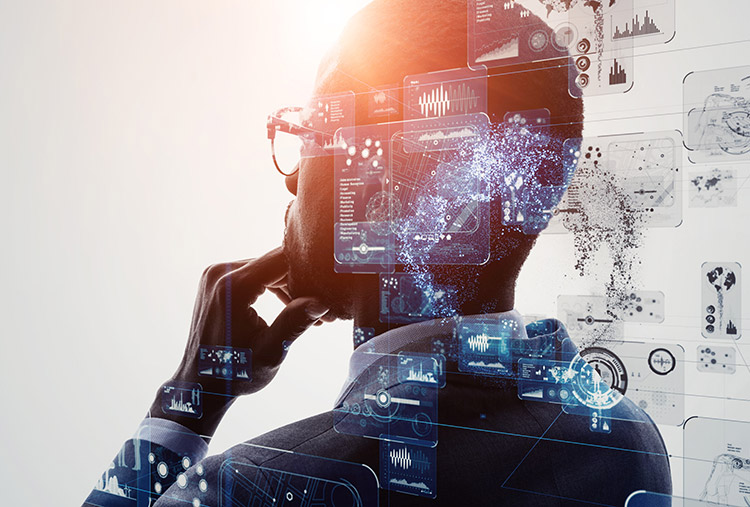|
|
At the IBA, we understand the transformative power of technology and its impact on a wide range of legal and societal issues. Established in 2024, this hub serves as a central resource for exploring the evolving tech landscape, including in relation to artificial intelligence (AI), which continues to generate a significant amount of both excitement and concern
7th Mergers and Acquisitions in the Technology Sector Conference
Apr 29, 2024
AI development, notably generative AI, has experienced a significant increase, with life sciences and healthcare as a key investment area. Despite its potential benefits in diagnosis and treatment, AI presents risks such as biases, accessibility issues and cybersecurity threats. Additionally, there are concerns about social risks.
Following the publication of the IBA’s The Future is Now report on AI, the BIC has continued to focus on ethics and the impact of AI on core values of the profession. The BIC Working Group on AI has developed an extended survey of guidance for lawyers around the world and has focused on synthesising the common denominators of ethics issues. For bars that have not yet addressed such issues, and for those in more advanced stages of engagement on the issue, the programme will highlight best practices and address how bars can develop road maps for development in this area.
19th Annual Bar Leaders' Conference
Apr 20, 2023
This article discusses artificial intelligence in Canadian immigration, including recent developments. It also deals with ethical considerations for automated decision-making, and the evolution of artificial intelligence regulations.
Apr 20, 2023
This article discusses artificial intelligence in Canadian immigration, including recent developments. It also deals with ethical considerations for automated decision-making, and the evolution of artificial intelligence regulations.
The panel will discuss proposed forthcoming legislation in the EU, UK and around the world regarding artificial intelligence, as well as competition and regulatory issues raised by artificial intelligence.
33rd Annual IBA Communications and Competition Law Conference
The IBA AI Task Force looks at issues relating to the regulation of artificial intelligence, AI's impact on the legal profession, and advocating for best practices among bar associations. In 2024 the Task Force produced a report, 'The Future is Now: Artificial Intelligence and the Legal Profession''
AI is everywhere. How can the in-house legal function assist in monitoring its use within the company, and ensuring compliance with applicable regulations? Where can AI be the most helpful to the legal team itself, and under what conditions can its efficiency and accuracy be assured? What is the proper analysis for issues arising with regard to provenance, input and output of data?
IBA Annual Conference Toronto 2025
Jul 28, 2025
Artificial intelligence (AI) is absolutely crucial for understanding the future of labour relations. In Spain, specific clauses on this subject have started to appear in a few collective bargaining agreements and are based essentially on respecting legal representatives’ rights to information and on the impact that AI can have on working conditions.
The use of artificial intelligence to create works of visual art has raised a host of questions about originality, authorship, and the marketplace.
IBA Annual Conference Paris 2023

May 30, 2022
As artificial intelligence (AI) continues to develop, complicated questions arise regarding the scope and role AI technologies play in legal practice. This article identifies and discusses challenges and opportunities that AI’s development pose to legal practice from a US perspective, focusing on AI’s applications to US dispute resolution generally, and to US arbitration in particular. It first discusses problems with defining AI, highlighting competing definitions that conceptualise AI from technical and social perspectives. It then discusses how AI tools currently influence, and will continue to influence, dispute resolution practice in the US. Next, it analyses key US legal considerations influencing how AI will be integrated into US dispute resolution systems, including trends such as how combining a developing technology with an evolving legal landscape is a recipe for uncertainty, and how the variety of relevant actors and sources of law in the US federal system generates complexity when adapting AI tools for use in arbitration. Additionally, it discusses how regulation does not happen in a vacuum, but is coloured by regulatory competition.
This panel will explore the intersection between class actions and Artificial Intelligence (AI), a rapidly expanding field.
IBA Annual Conference Toronto 2025
Dec 04, 2025
Artificial intelligence (AI) is developing rapidly in China, with the number of patents and the size of the market both ranking highly among countries. However, this rapid development has posed new challenges to the legal framework, ethical norms and social governance, prompting China to continuously adjust and improve the relevant regulatory system.
In April 2021 the EU Commission published a proposal for the first horizontal regulation on artificial intelligence: the EU artificial intelligence act.
IBA Annual Conference Miami 2022
Jun 20, 2023
This article analyses legal and ethical issues which have come about in the wake of recent developments in the artificial intelligence (AI) market. It also contrasts India’s regulatory position on AI with regulatory frameworks in jurisdictions such as Australia, China, the European Union, Japan, Singapore, the United Kingdom and the United States.
HumanRightsSome countries are starting to allow immigration decisions to be made by machines programmed to apply to law to specific fact situations. That includes immigration law. Is this a violation of a person’s human rights? Or a way to produce better decisions and reduce the biases and inefficiencies that make life tougher for immigrants in many jurisdictions? This panel will explore how different countries are approaching AI and immigration law and look at the advantages and disadvantages associated with making immigration decisions with an algorithm.
IBA Annual Conference Miami 2022
Dec 13, 2021
From Homer’s Iliad to 20th century science fiction movies, through Da Vinci’s humanoid robot, artificial intelligence (AI) has been a subject of humankind’s dreams for centuries. Although the notion of AI has started as a fantasy, sometimes even dystopian, like Spielberg’s film Minority Report which depicts a worrying future of advanced technologies in law enforcement, AI is now a reality in daily life, and has shifted human lifestyles. Cars, phones and even healthcare are just some examples of sectors which AI has penetrated. Considered as a branch of computer sciences, AI refers to the building of ‘smart’ machines, able to perform human tasks by mimicking human attributes, intelligence, and reasoning, but without direct human intervention.
18th Annual IBA Competition Mid-Year Conference
Uptake of Artificial Intelligence by in-house teams by Susie Lunt. IHP August 2019
35th Annual IBA Communications and Competition Law Conference
Apr 29, 2024
Artificial Intelligence (AI) has transformed medical care, with the potential to transform patient care and quality of life. It has had a major impact in the field of medical research and diagnosis; has eliminated time-consuming data monitoring methods and has improved the interpretation of large amounts of data derived from different sources to facilitate diagnosis and enhance the ability to execute early treatment initiatives, therefore preventing disease. The era of AI envisages new roles for healthcare providers, legal practitioners and academics as well public policy designers. This article analyses some of the ethical and legal issues in the healthcare sector.
3rd IBA Global Professional Ethics Symposium
Apr 29, 2024
This article examines the evolving intersection of artificial intelligence (AI) and the life sciences sector in Singapore, focusing on the relevant regulatory frameworks and developments. The article further describes the public consultation approach that Singapore has taken in relation to addressing ethical, legal and social concerns for human biomedical research.
Compliance, governance and innovation: balancing risks and opportunities of doing business in Latin America
To participate please go to SLIDO.com and enter the code: #7397107
How will artificial intelligence replace, enhance, and undermine dispute resolution and the rule of law?
IBA Annual Conference Paris 2023
Dec 12, 2023
Artificial Intelligence (AI) has rapidly emerged as a pivotal force in the contemporary workplace, redefining the facets of business operations, workforce management and employees’ interaction with technology. The profound impact of AI on the Indian workplace has emphatically transgressed its ethical and legal concerns, underscoring the need for comprehensive legislation or well-defined directives to regulate the use of AI effectively. In this article, we aim to highlight the legal and ethical complexities related to the use of AI at the Indian workplace and the requirement to have robust legislation/directives in place to regulate the use of AI.
This session will host a high-level discussion on AI's disruptive force over the legal profession. The panel will delve into AI's looming and dominating role in the provision of legal service and how its increasing impact is taken by regulators around the world. Cultural differences, the level of economic development, as well as the civil law/common law divide across various jurisdictions will be explored as a subset of the main theme.
IBA Annual Conference Paris 2023
Jun 20, 2022
This article outlines the key milestones in the process of regulating AI in Brazil. It compares the Bill of Law No 21 of 2020, which is the first attempt to create a legal framework for AI in the country, with its main inspirations: the OECD Recommendation and the EU AI Act.
As part of the IBA presidential task force on artificial intelligence, the Bar Issues Commission is tasked with reviewing the impact on regulatory and ethical rules regarding lawyers.
17th Annual Bar Leaders' Conference
Dec 13, 2021
The second part of this analysis focuses on the high-risk AI systems, their scope and the requirements prescribed by the EU’s draft AI Act. It also pinpoints several important challenges that need to be addressed and issues to be resolved in the final version of the text.
New technologies bring new challenges for the modern world and on how to apply the law. To update the legislation may provide a solution, but it takes time, and legislative process is never so fast as the development of upcoming technologies. To interpret the existent legislation is a better solution but depends on studied and experienced lawyers.
Key issues:
- General legislation for AI: data privacy, consumer protection and liabilities.
- Personal data protection in Morocco;
- AI as law operator: what happens to ethics and human touch?
Next gen legal summit: The fundamentals of international legal practice
Dec 02, 2021
The uses for artificial intelligence (AI) across organisations have proliferated, particularly as the amount of data generated by companies has risen sharply. The use of AI carries risks however, including in respect of transparency. In-House Perspective examines the potential pitfalls and looks at the EU’s attempts to improve AI transparency through a proposed regulation.
Fourth IBA India Litigation and ADR Symposium
Jun 25, 2021
The first part of this analysis encompasses the AI Act’s scope, as well as prohibited AI practices, AI systems needing higher level of transparency and those subject to voluntary compliance. The second part will be published in the next volume of the Technology Law eBulletin, and will concentrate on high-risk AI systems and the outlined set of requirements for them.
The session will address how Artificial intelligence (AI) impacts the different areas of practice and industries that relate to SEERIL.
IBA Annual Conference Toronto 2025
For good or bad, the digital revolution is transforming the world. The legal profession is not untouchable. Our duty is to promptly embrace the challenge, engage in the conversation and make sure that this will enhance our practice rather than make us obsolete.
For many years, there has been discussion about the need to choose the right technology, and then the challenge of implementation and ‘buy in’. Some law firms and legal departments have struggled with selection and adoption. Then along came AI. This has made the lives of law firm leaders even more confusing. Now we have AI, do we still need “technology”? Is AI simply a fad or is it truly the dramatic change some suggest? This session provides practical advice about how law firm leaders can tackle decisions around technology and AI.
IBA Middle East Conference: Law firms and clients working together
Jun 02, 2025
The use of artificial intelligence (AI) in healthcare has grown exponentially, as a reflection of the accelerated pace of technological innovation that characterises this field. This fast pace of development, of which generative AI is an example, brings both benefits and risks, which translate into challenges for Brazil in regard to the process of regulating this field.
Does artificial intelligence (AI) (also generative) already have a role in advocacy?
IBA Annual Conference Mexico City 2024
Apr 29, 2025
The rapid integration of artificial intelligence (AI) into business operations must have robust governance frameworks to navigate the complex legal and ethical landscape. This article examines the definition and key components of AI governance, its implementation within organisations and the critical considerations surrounding data protection, intellectual property, compliance and AI ethics. Furthermore, it provides focused analysis of the emerging regulatory environment in Colombia, specifically addressing Circular 002 of 2024 issued by the Superintendence of Industry and Commerce (Superintendencia de Industria y Comercio or SIC) and CONPES 4144 of 2025.
In a time marked by unprecedented advancements in artificial intelligence (AI), organisations are increasingly harnessing its power into their operations to drive innovation and gain competitive advantages.
IBA Annual Conference Mexico City 2024
Dec 20, 2023
The legal profession's dynamic relationship with technology, from email to virtual courtrooms, is constantly reshaping the practice of law. Welcome to the new frontier—the intersection of technology, artificial intelligence (AI), blockchain, and arbitration. This article explores some interesting applications of technology and AI in arbitration and growing global acceptance around it. Needless to say, innovation brings along a plethora of unresolved questions and challenges, leaving practitioners uncertain about the use or potential misuse of sensitive data. It's time to address the difficult questions on regulatory oversight and transparent usage of AI, to avoid controversies and chart an ethical course for integration of technology in dispute resolution.
Experts will examine the roles of Artificial intelligence (AI), blockchain, and cybersecurity in optimising operations, enhancing safety, and improving regulatory compliance, while also addressing potential risks and ethical considerations.
IBA Annual Conference Toronto 2025
Dec 03, 2025
This article explores the impact of artificial intelligence (AI) on drug discovery and the legal issues surrounding AI-generated inventions. It analyses the progression of AI-driven tools, their integration into the pharmaceutical industry, and the intellectual property challenges that arise as AI systems become increasingly independent. This article highlights the need to reassess existing legal frameworks to keep pace with the evolving autonomy of AI in the drug development process.
27th Annual Competition Conference
Nov 27, 2025
Recent court judgments are helping to define the legal boundaries for AI training and intellectual property (IP) rights.
Cybersecurity, data privacy and artificial intelligence are all over the news these days.
IBA Annual Conference Miami 2022
Apr 29, 2024
Throughout history, technological developments have played a fundamental role in revolutionising the provision of healthcare. Corroborating this premise, artificial intelligence (AI) is currently leading the Fourth Industrial Revolution, opening an unprecedented era of advances in healthcare technology through the introduction of technological tools into the life sciences. Seeking to enlighten the synergy between this disruptive technology and the life sciences, this article explores the major developments arising from the integration of AI into the various branches of the life sciences, as well as the main challenges and ethical considerations that accompany these developments.
Apr 25, 2024
Italy has recently experienced an increase in the adoption of AI-assisted tools among employers seeking to leverage technology to enhance HR efficiency and decision-making processes. This is particularly so in talent identification/recruitment processes and in training/performance-measurement areas. However, the Italian legal framework (ie the applicable laws, some of them dating many years ago, and how they are interpreted by the courts, tend to be rather restrictive) poses significant limitations on the implementation of AI-driven tools, principally as concerns regarding the safeguarding of workers’ rights, transparency and data protection, information to unions and non-discrimination. This contribution tries to focus on how to balance such restrictions with the need to keep pace with the advances in AI, which are expected to reshape the HR world.
Jun 20, 2023
Artificial intelligence allows employers to regain lost rights by improving the organisation’s supervision and error detection capabilities, both before and during the employment relationship.
The development of various legal software, ranging from e-registries to artificial intelligence (AI) and other innovations, is changing the day-to-day work of all law firms, from one-lawyer boutiques to global firms.
6th IBA Global Entrepreneurship Conference: The Netherlands – sailing the seas of global innovation
This session will explore how we can use artificial intelligence in our practice to become better lawyers, as well as how this technology is reshaping the profession.
IBA Annual Conference Toronto 2025
Continuing developments in machine learning and artificial intelligence (AI) have raised concerns that algorithms may be unfairly or even illegally biased. This session allowed participants to hear from and interact with leading specialists in the fields of machine learning and AI as they intersect with ethics and the law, in order to understand if eliminating bias in machine learning is possible or even desirable from a technical standpoint.
Artificial intelligence (AI) is transforming the legal profession.
IBA APAG Event: Exploring the use of IBA Rules and Guidelines in Asia and the rise of artificial intelligence in international arbitration
|










